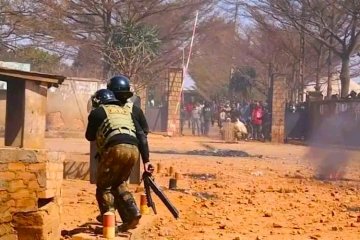Already a subscriber? Make sure to log into your account before viewing this content. You can access your account by hitting the “login” button on the top right corner. Still unable to see the content after signing in? Make sure your card on file is up-to-date.
Madagascar has announced nationwide curfews amid ongoing protests and riots over the country’s recent utility failures that have left citizens pissed.
Getting into it: The unrest stems from months of power cuts and water shortages across the country. Many households and businesses have endured blackouts lasting for half the day, while clean water has become scarce. The national utility company, Jirama, is under fire for mismanagement, corruption, and government neglect that has left essential infrastructure crumbling. Frustration, especially among young people, has boiled over after repeated promises from President Andry Rajoelina’s administration, fueling a protest movement that’s grown into mass demonstrations.

Thousands of demonstrators took to the streets despite a formal government ban on gatherings, setting tires on fire, barricading roads, and chanting slogans like “We need water, we need electricity.” As the protests intensified, the situation spiraled into chaos, with reports of looting, arson, and targeted attacks on public infrastructure and private property. Government buildings were attacked, and the homes of politicians close to the president were vandalized or burned. The protests, mostly youth-led, were coordinated and mobilized through Facebook and other social media platforms, where opposition voices and grassroots activists called for mass civil disobedience and resistance.
In response, authorities deployed heavily armed police and military units throughout the capital, using tear gas and rubber bullets to disperse crowds. As violence spread into various neighborhoods, the government imposed a dusk-to-dawn curfew from 7:00 p.m. to 5:00 a.m., with security forces patrolling key areas to restore order. Schools have also been shut down, and access to central protest

Officials, including General Angelo Ravelonarivo of the joint police-military command, warned that “firm measures” would be taken against anyone attempting to defy the ban.







